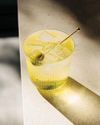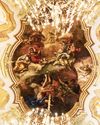This city has street feasts in shipping containers, music events in former factories and the first museum for digital art. Sound familiar? It’s not: this is Switzerland.

For a while in the early 1990s, there was a huge sign on the approach to the central railway station that announced your arrival into ZUREICH. Even if your German was limited, and even if you weren’t paying much attention, you registered the oddity. The sign wasn’t in the right place—it wasn’t on a platform, but on the side of a run-down building. It wasn’t the right size either. Surely too big. And the Swiss railways’ SBB arrow logo—that looked a bit off as well. But then, sooner or later, you figured it out. The sign looked weird because it was weird. It wasn’t a mistake, but a fake. It had been painted by art-school-educated squatters in imitation of the official SBB font and colours. And it wasn’t telling you where you were, but what you were. Zu reich. Too rich.
The squatters and their sign are long gone. But during my most recent trip here, it occurred to me that this had been more than just a smarter-than-average student prank. Fun, but faintly unsettling. Madcap, but also measured, like a ransom note written in perfect copperplate.
Zürich is a beautiful city, though temperamentally too demure, too self-effacing to be a fall-by-thesword heartbreaker. True, the lakeside setting is lovely. And there’s an austere elegance to the well preserved medieval buildings of the Old Town on both sides of the Limmat river. Here and there are some exquisite flourishes. The hypodermic spike of the Grossmünster church’s third spire, for instance, tipped in scarlet, never fails to provoke in me a strange shiver of delight—the involuntary tensing up of the left arm of someone who hasn’t quite got over his childish aversion to needles.
Diese Geschichte stammt aus der August/September 2017-Ausgabe von Condé Nast Traveller India.
Starten Sie Ihre 7-tägige kostenlose Testversion von Magzter GOLD, um auf Tausende kuratierte Premium-Storys sowie über 8.000 Zeitschriften und Zeitungen zuzugreifen.
Bereits Abonnent ? Anmelden
Diese Geschichte stammt aus der August/September 2017-Ausgabe von Condé Nast Traveller India.
Starten Sie Ihre 7-tägige kostenlose Testversion von Magzter GOLD, um auf Tausende kuratierte Premium-Storys sowie über 8.000 Zeitschriften und Zeitungen zuzugreifen.
Bereits Abonnent? Anmelden

Made In Nagaland
From home textiles to jewellery, clothing, and more, here are the 10 Naga craft brands you need to know. By Sohini Dey

TOKYO RIGHT NOW
As impossible to pigeonhole as ever, the Japanese capital is buzzing with fresh influences and new ideas

RAISING RAI: WHERE THE MAGIC HAPPENS
Raghu and Avani Rai on connecting via worlds seen through their lenses.

GILDED WATERS
Paula Hardy boards one of the last remaining dahabiyas on the Nile for a different perspective of Egypt's storied river

THE GIRL WITH GRAND DESIGNS
Gauravi Kumari is part of Jaipur's new creative set that is bringing fresh perspectives to the city's design legacy.

A FACE FOR ADVENTURE
Retooling the iconic Rolex GMT-Master II for fresh explorations.

THE GRAND seduction
Palermo's chaos, swagger, and temperamental charm cast a hypnotic spell.

Rhythm Divine
Wherever you go in Gwalior, the myth and magic of Tansen are inescapable, as Sam Dalrymple finds out.

IDEAL WORLD
Palestinian chef Fadi Kattan explains why he went ahead with the publication of Bethlehem, his celebratory cookbook.

NUJUMA, A RITZ-CARLTON RESERVE SAUDI ARABIA
On alittle-visited Red Sea archipelago, the Middle East’s first Ritz-Carlton Reserve reflects both untapped nature and hyperreal modernity, finds Noo Saro-Wiwa.